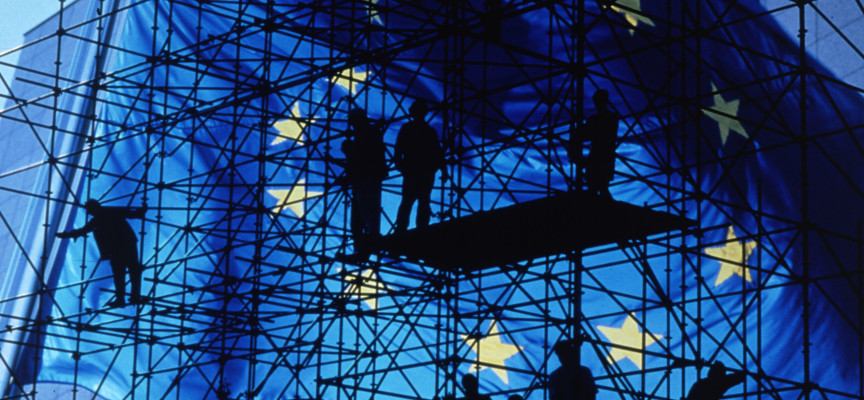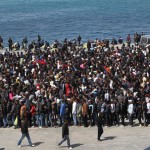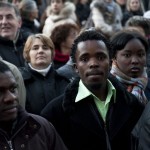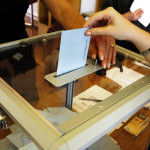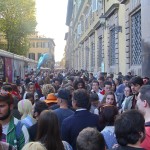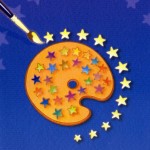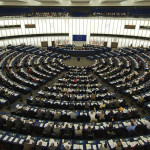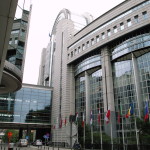From May 22nd to May 25th elections for the European Parliament will take place. By the way: has anyone thought about what this staggered election date means, could it be that voting behavior in later voters is affected by the election results of earlier voters?
The Austrian Catholic bishops have called for participation in the elections and recalled that the European Union – a brainchild of Christian motivated politicians – needs the cooperation of the people and the commitment of Christians. The bishops specified a number of challenges that await the newly elected European parliamentarians:
– Overcoming the economic, financial and sovereign debt crisis. The future prospects of the younger generation may not be diminished. Yes to a policy of moderation, but no widening of the gap between rich and poor.
– Combating youth unemployment.
– Europe must not become a fortress. The bishops remember the impressive visit of Pope Francis on the island of Lampedusa: “Asylum and migration are permanent challenges for a prosperous and human rights committed European Union”. The responsibility may be charged not only to countries in southern and eastern Europe.
– Securing climate targets, promoting sustainability as a principle of economic policy and personal life.
– Protecting the right to life and the family (even if this is not a direct competence of the European Union).
– Increasing global commitment to comprehensive religious freedom.
Given the crisis in Ukraine the Austrian Bishops say: “Peace in Europe is not self-evident, but a permanent task”. And they do not hide the fact that old reflexes (keyword: nationalism ) could awaken again which led to the catastrophes of the 20th century: World War I (outbreak 100 years ago), World War II (outbreak 75 years ago), as a consequence division of the continent (overcome only 25 years ago).
It is expected that nationalist parties at the European elections will have 20 to 25 percent. No pleasing thought hearing f.e. of the February expressions of the top candidate of the Austrian Freedom Party (FPÖ), Andreas Mölzer: compared to the regulations in the EU the Third Reich was “probably informal and liberal” and the European Union is a “Negro conglomerate”. When politicians indulge in fantasies like these, the fear of the reawakening of the bad reflexes of the erring 20th century is only too legitimate.
Von 22. bis 25. Mai finden die Europawahlen statt. By the way: Hat schon jemand darüber nachgedacht, was dieser gestaffelte Wahltermin bedeutet, ob Wählerverhalten bei den später Wählenden nicht durch die Wahlergebnisse der früher Wählenden beeinflusst wird?
Die österreichischen katholischen Bischöfe haben zur Wahlbeteiligung aufgerufen und daran erinnert, dass die Europäische Union – ein brainchild christlich motivierter Politiker – die Mitwirkung der Bevölkerung und das Engagement von Christen braucht. Die Bischöfe haben eine Reihe von Herausforderungen benannt, die auf die neugewählten Euro-Parlamentarier warten:
- Überwindung der Wirtschafts-, Finanz- und Staatsschuldenkrise. Die Zukunftschancen der jungen Generation dürfen nicht geschmälert werden. Ja zu einer Politik des Maßhaltens, aber keine Vertiefung der Kluft zwischen Arm und Reich.
- Bekämpfung der Jugendarbeitslosigkeit.
- Europa darf nicht zur Festung werden. Die Bischöfe erinnern an den beeindruckenden Besuch von Papst Franziskus auf Lampedusa: „Asyl und Migration sind bleibende Herausforderungen für eine wohlhabende und den Menschenrechten verpflichtete Europäische Union”. Die Verantwortung darf nicht nur den Ländern im Süden und Osten Europas aufgeladen werden.
- Erreichung der Klimaziele, Förderung von Nachhaltigkeit als Prinzip der Wirtschaftspolitik und der persönlichen Lebensweise.
- Schutz des Rechtes auf Leben und der Familie (auch wenn es hier nicht um eine direkte Kompetenz der Europäischen Union geht).
- Verstärkter weltweiter Einsatz für umfassende Religionsfreiheit.
Angesichts der Ukraine-Krise sagen die österreichischen Bischöfe: Friede in Europa ist keine Selbstverständlichkeit, sondern eine bleibende Aufgabe. Und sie verhehlen nicht, dass jene alten Reflexe (Stichwort: Nationalismus) wieder erwachen könnten, die zu den Katastrophen des 20. Jahrhunderts geführt haben: Weltkrieg I (Ausbruch vor 100 Jahren), Weltkrieg II (Ausbruch vor 75 Jahren), als Konsequenz Teilung des Kontinents (Überwindung erst vor 25 Jahren).
Es wird damit gerechnet, dass bei den Europa-Wahlen nationalistische Parteien 20 bis 25 Prozent erhalten. Kein erfreulicher Gedanke, wenn man etwa an Februar-Äußerungen des Spitzenkandidaten der FPÖ, Andreas Mölzer, denkt. Im Vergleich zu den Reglementierungen in der EU sei das Dritte Reich „wahrscheinlich formlos und liberal” gewesen und: Die EU sei ein „Negerkonglomerat”. Wenn Politiker sich solchen Phantasien hingeben, ist die Angst vor dem Wiedererwachen der schlimmen Reflexe des in die Irre gegangenen 20. Jahrhunderts nur zu berechtigt.
Pace, compito permanente
Dal 22 a 25 maggio si svolgeranno le elezioni europee. A proposito: qualcuno ha già pensato a ciò che significhi la sfasatura delle date per le elezioni, se il comportamento di voto degli elettori che votano più tardi non sarà influenzato dai risultati elettorali degli elettori che avranno già votato?
I vescovi cattolici austriaci hanno invitato ad andare a votare e hanno richiamato il fatto che l’Unione europea – frutto di politici cristiani motivati – ha bisogno della cooperazione dei popoli e dell’impegno dei cristiani. I vescovi hanno messo in luce una serie di sfide che attendono gli euro-parlamentari neoeletti:
• superamento della crisi economica, finanziaria e dell’indebitamento degli Stati. Le prospettive future per le nuove generazioni non possono essere sminuite. Sì a una politica di moderazione, ma nessun allargamento del divario tra ricchi e poveri;
• lotta alla disoccupazione giovanile;
• l’Europa non deve diventare una fortezza. I vescovi ricordano la toccante visita di papa Francesco a Lampedusa: “Asilo e migrazione sono sfide che permangono per un’Unione europea prospera e impegnata sul fronte dei diritti umani”. La responsabilità non può essere scaricata solo sui Paesi dell’Europa meridionale e orientale;
• il raggiungimento degli obiettivi sul clima, la promozione della sostenibilità come principio di politica economica e di stile di vita personale;
• tutela del diritto alla vita e alla famiglia (anche se in questo ambito non si tratta di una competenza diretta dell’Unione Europea);
• maggiore impegno globale per una completa libertà religiosa.
Riguardo alla crisi in Ucraina i vescovi europei dicono: la pace in Europa non è un’evidenza, ma un compito permanente. E non nascondono il fatto che potrebbero risvegliarsi di nuovo quei vecchi comportamenti (parola chiave: nazionalismo) che hanno portato alle catastrofi del XX secolo: la Prima Guerra Mondiale (scoppiata 100 anni fa), la Seconda Guerra Mondiale (scoppiata 75 anni fa), come conseguenza della divisione del continente (superata solo 25 anni fa).
Si prevede che alle elezioni europee i partiti nazionalisti raggiungano tra il 20 e il 25%. Non è una considerazione piacevole, se ci si ricorda delle dichiarazioni di febbraio del primo candidato del Partito della Libertà austriaco (FPÖ), Andreas Mölzer. Rispetto alle norme dell’Ue, il Terzo Reich è stato “probabilmente non vincolante e liberale” e l’Ue è un “conglomerato negro”. Quando i politici indulgono in tali fantasie, la paura del risveglio dei comportamenti negativi che hanno portato alla pazzia del XX secolo, non può che essere giustificata.
Erich Leitenberger
Spokesman "Pro Oriente" Foundation, Austria
Latest posts by Erich Leitenberger (see all)
- A special journey - 24 novembre 2014
- A day of deep mourning - 29 luglio 2014
- Some fresh air for Europe - 17 giugno 2014

